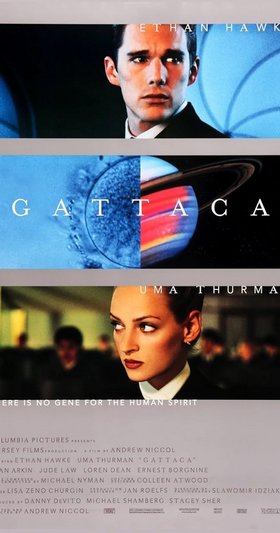Gattaca
 for brief violent images, language and some sexuality.
for brief violent images, language and some sexuality.
Reviewed by: Dave Rettig
CONTRIBUTOR
| Moral Rating: | Average |
| Moviemaking Quality: |
|
| Primary Audience: | 18 to Adult |
| Genre: | Sci-Fi |
| Length: | 1 hr. 52 min. |
| Year of Release: | 1997 |
| USA Release: |
October 24, 1997 |







The film’s title is based on the letters G, A, T, and C, which stand for guanine, adenine, thymine, and cytosine, the four nucleobases of DNA.
Human genetics
Morality of a future society driven by EUGENICS where children are conceived through genetic selection to ensure they possess the best hereditary traits of their parents
EUGENICS: a set of beliefs and practices that aims to improve the genetic quality of a human population / Historically, eugenicists have attempted to alter human gene pools by excluding people and groups judged to be inferior or promoting those judged to be superior.
Oppressive social structure
Struggling to overcome genetic discrimination / effects of prejudice
Genetic determinism
Concerns over reproductive technologies that facilitate eugenics, and the possible consequences of such technological developments for society
The idea of destiny and the ways in which it can and does govern lives
Battling both society and themselves to find their place in the world and who they are destined to be according to their genes




| Featuring |
|---|
|
Ethan Hawke … Vincent Freeman, impersonating Jerome Eugene Morrow Uma Thurman … Irene Cassini Jude Law … Jerome Eugene Morrow Alan Arkin … Detective Hugo Gore Vidal … Director Josef Ernest Borgnine … Caesar Loren Dean … Anton Freeman Maya Rudolph … delivery nurse Xander Berkeley … Dr. Lamar Elias Koteas … Antonio Freeman Tony Shalhoub … German |
| Director |
|
Andrew Niccol |
| Producer |
|
Danny DeVito Michael Shamberg See all » |
| Distributor |
If you could prevent your unborn child from ever getting cancer, would you do so? Or eliminate the possibility of alcoholism? Or increase your child’s IQ by 40 points? “Gattaca” is a film based on a society in which this possibility has become all too common. Genetic engineering of unborn children is the standard. Children are born with the best possible health, the best possible outlook, and the best possible intelligence. The downside? None, unless you are a “faith child,” a child born out of love, created naturally and not engineered for perfection.
Imagine a society where everyone is more intelligent and healthier than you. Imagine a society where your genetic makeup—engineered or natural—determines the job for which you are eligible, whether or not you can be insured, and who associates with you. This is the plight of Vincent Freeman (Ethan Hawke), a young man with a dream of working for an elitist company in the prestigious position of a spacecraft navigator.
This film contains two bedroom scenes (with no nudity and no sex acts), minimal profanity, brief male nudity, some violence, and a bit of blood. If these do not offend you, this movie offers a launching board for intelligent discussion of some key social issues. “Gattaca” offers an opportunity to discuss the effects of prejudice and the reality of genetic determinism (the theory that people are born with certain tendencies, instead of choosing their lifestyle). These are hot topics and Christians should understand what the world teaches versus the truth of the Bible. This movie opens these subjects for discussion.
This is not your typical science fiction film. No aliens—no laser guns—no mutant powers. This is a drama set in a futuristic world, and is unsettling because of the potential reality of such a world. The movie keeps you on the edge of your seat as Freeman struggles to succeed. If you decide to see “Gattaca”, use this film to unveil the myth that we are controlled by our genes and to smash the sin of discrimination.
Although rated PG-13, I would suggest leaving the children at home, unless you are prepared to invest some time covering the many issues this movie touches.


In spite of the film’s negatives, though, I think it’s definitely worth seeing, *especially* for anyone interested in medical ethics. Don’t watch it with your brain turned off, though, and don’t take your kids (or even young teens) to see it. It’s an incredibly thought-provoking and inspiring film, and highly recommended for mature viewers. “There is no gene for the human spirit.” Amen. [3/4½]
The Technology Future without God is more likely to be “Gattaca” than “Star Trek”.
Defects, illnesses, handicaps, etc when responded to properly can be used to strengthen an individual and bring glory to God. What is shown in Gattaca is a human who does triumph over physical weakness through the strength it developed in his character. I would not see this with small children as it is very “deep” philosophically.
As for the nude scenes, of course they are sexual in content and context—what else are they there for? The movie stands alone quite nicely without them, and we didn’t miss a thing by not watching them. This film should force people to see what the world will be like with all references to God, Jesus and faith absent. The only religion that exists is faith in human power and technology leaving a desolete, sterile, grim and hopeless world.
The most troubling part of the movie for me was that the hero continually lied and cheated, and we were supposed to like him for that. As a youth minister, that is definitely not the message I want our teens to be taught. Also, the suicide seemed pointless (as if there is ever a point).
As a movie, it was better than most but still had some gaping holes. Vincent carried on his deception for much longer than would be possible. Also, what happened to Anton? He just disappeared with no explanation.
Good movie if you want to think a little—but be mostly led. Definitely not for the action crowd.
While directly related to God, the movie shows the things that a poor soul would go through for acceptance and fulfilling his goals.
The end of the movie was the part that made the most impact. It was the part when I realized that, here was a man (Vincent) that wanted to live his through another man, and the other man ended up living his life through Vincent. Look at what it caused them.
When Vincent finally gave up the deception and showed his true identity and reclaimed his life, he got his dream, and when the other guy (can’t seem to remember his name) realized he gave up his life and pretended he was living (through Vincent) he killed himself, with no future or present. Although Suicide is an issue that is most ungodly, I didn’t feel this was being glorified. It was more an ironic tragedy than anything else.


I’m very interested that homosexuality was not on the list. Certainly here is Hollywood’s chance to insert the genetic homosexuality lie. They’re in a quandary, because the writer’s would have to state whether homosexuality can be removed or not. The truth is it’s a sin choice: a learned behavior.
I’m glad the movie at least saw a value in the unborn rather than portraying a future of abortion and infanticide as some twisted “solution.” It is also very interesting that the “faith child” portrays the hero (although a deceiving liar). This movie did seem to do a good job of slipping by the Doctrine of Hollywood. You could skip this movie unless you had a research interest.